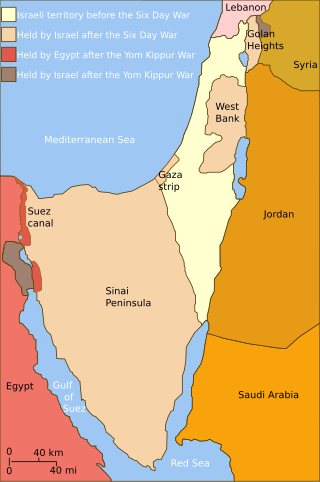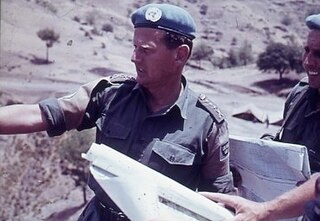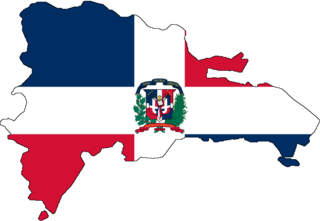
United Nations Security Council Resolution 338 was a three-line resolution adopted by the UN Security Council on 22 October 1973, which called for a ceasefire in the Yom Kippur War in accordance with a joint proposal by the United States and the Soviet Union. It was passed at the 1747th Security Council meeting by 14 votes to none, with China abstaining.

United Nations Security Council Resolution 339 was adopted on 23 October 1973 in order to bring a ceasefire in the Yom Kippur War where Resolution 338 two days before had failed.

United Nations Security Council Resolution 49, adopted on May 22, 1948, considering that the previous resolutions of the Security Council in respect to Palestine have not been complied with and that military operations were still taking place in Palestine, the resolution called upon all governments and authorities to abstain from any further hostile military action in Palestine and to that end issue a cease-fire order to their military and paramilitary forces to come into effect at noon, May 24, 1948, New York City local time. The resolution further ordered the Truce Commission for Palestine set up in United Nations Security Council Resolution 48 to report to the Council on the compliance of the concerned parties with the resolution.

United Nations Security Council Resolution 50, adopted on May 29, 1948, called upon all governments and authorities involved in the conflict in Palestine to order a cessation of all acts of armed force of four weeks, to refrain from introducing any fighting personnel into Palestine, Egypt, Iraq, Lebanon, Saudi Arabia, Syria, Transjordan or Yemen during the cease-fire, to refrain from importing or exporting war material into or to Palestine, Egypt, Iraq, Lebanon, Saudi Arabia, Syria, Transjordan or Yemen during the cease-fire.

United Nations Security Council Resolution 54, adopted on 15 July 1948, determined that the situation in Palestine constitutes a threat to the peace within the meaning of Article 39 of the Charter of the United Nations. The resolution ordered all governments and authorities concerned to desist from further military action and to issue a cease-fire to their military and paramilitary forces to take effect at a time to be determined by the mediator in the next three days. It also declared that failure to comply with these orders would demonstrate the existence of a breach of the peace within the meaning of article 39 of the Charter and would require immediate consideration by the Council.

United Nations Security Council Resolution 66, adopted on December 29, 1948, in response to a report by the Acting Mediator regarding hostilities which broke out in southern Palestine on December 22 despite UN calls for a cease-fire, the Council demanded the immediate implementation of United Nations Security Council Resolution 61. The Resolution instructs the Acting Mediator to facilitate the complete supervision of the truce by the UN observers. The Resolution further instructs the committee appointed in UNSC Resolution 61 to meet at Lake Success, New York on January 7 to consider the situation in southern Palestine and to report to the Council on the extent to which governments have or have not complied with UNSC Resolutions 61 and 62. The Resolution also invited Cuba and Norway to replace the two retiring member of the committee on January 1.

United Nations Security Council Resolution 73, adopted on August 11, 1949, noted with satisfaction the Armistice Agreements between the parties involved in the 1948 conflict in Palestine and then expressed the hope that a final settlement of all questions outstanding between the parties might be achieved soon. The Resolution went on to relieve the Action Mediator in Palestine, as his duties had been fulfilled, and requested the Secretary-General arrange for the continued service of the personnel of the present Truce Supervision Organization as may be required in observing and maintaining the cease-fires and Armistices. The Resolution also requested that the Chief of Staff of the TSO report to the Council on the observance of the cease-fire.

United Nations Security Council Resolution 92, adopted on May 8, 1951, recalling its previous resolutions demanding a cease-fire in the Arab-Israeli conflict the Council noted with concern that fighting had broken out in and around the demilitarized zone established by the Israel-Syrian General Armistice Agreement of 20 July 1949 and that fighting was continuing despite the cease-fire order of the Acting Chief of Staff of the United Nations Truce Supervision Organization in Palestine. The Council called upon the parties of persons in the areas concerned to cease fighting and called them to comply with their obligations and commitments to previous resolutions and Agreements.

United Nations Security Council Resolution 193 was adopted on August 9, 1964. After a serious deterioration of the situation in Cyprus, the Council reaffirmed an appeal to Turkey, to cease bombarding the island, and to Cyprus, ordering all her armed forces to cease firing. The Council called upon all to co-operate fully with the Commander of the United Nations Peacekeeping Force in Cyprus and to refrain from any action that might exacerbate or broaden the hostilities.
United Nations Security Council Resolution 199, adopted on December 30, 1964, requested that all States refrain from intervening in the domestic affairs of the Congo and appealed for a cease-fire there. After applauding the Organization for African Unity the Council called on States to assist it in achieving its objectives in the Democratic Republic of the Congo.

United Nations Security Council Resolution 205, adopted on May 22, 1965, in the face of a potentially widening conflict in the Dominican Republic, the Council requested that the temporary suspension of hostilities in Santo Domingo called for in United Nations Security Council Resolution 203 be transformed into a permanent cease-fire and invited the Secretary-General to submit a report to the Council on the implementation of this resolution.

United Nations Security Council Resolution 211 was adopted on September 20, 1965. After the calls for a cease-fire in resolutions 209 and 210 went unheeded, the Council demanded that a cease-fire take effect at 0700 hours GMT on September 22 and that both forces withdraw to the positions held before August 5. The Council requested the Secretary-General ensure the supervision of the cease-fire and called on all states to refrain from any action which might aggravate the situation. The Council also decided that as soon as a cease-fire could be reached it would consider what steps could be taken to assist towards a settlement of the political problem underlying the conflict.

United Nations Security Council Resolution 214, adopted on September 27, 1965, after expressing concern that the cease-fire called for in resolutions 209, 210 and 211 was not holding, the Council demanded that the parties honor their commitment, cease-fire and withdraw all armed personnel.

United Nations Security Council Resolution 435, adopted on September 29, 1978, put forward proposals for a cease-fire and UN-supervised elections in South African-controlled South West Africa which ultimately led to the independence of Namibia. Importantly, it established the United Nations Transition Assistance Group (UNTAG) which oversaw the election and the South African withdrawal.

United Nations Security Council Resolution 265, adopted on April 1, 1969, after reaffirming resolution 248, the Council condemned Israel's for its premeditated air attacks on Jordan villages in flagrant violation of the United Nations Charter and cease-fire resolutions and deplored the loss of civilian life and damage to property.

United Nations Security Council Resolution 270, adopted on August 26, 1969, after an air attack by Israel on Southern Lebanon, the Council condemned Israel and deplored all incidents in violation of the cease-fire and the extension of the area of fighting. The Council also declared that such grave violations of the cease-fire could not be tolerated and that the Council would have to consider further and more effective steps as envisaged in the Charter.

United Nations Security Council Resolution 340 was adopted on October 25, 1973, during the Yom Kippur War. It was passed after the Security Council was informed of the apparent failure of UNSCR 338 and UNSCR 339 to end the fighting.
United Nations Security Council Resolution 348, adopted on May 28, 1974, after a report from the Secretary-General, the Council welcomed the determination of Iran and Iraq to de-escalate the situation and improve relations. The resolution went on to state that both parties had agreed to a strict observance of the March 7 cease-fire agreement, to withdraw concentrations of armed forces along the entire border, the creation of a favorable atmosphere and an early resumption of conversations to settle all bilateral issues.

United Nations Security Council Resolution 1860, adopted on January 8, 2009, after recalling resolutions 242 (1967), 338 (1973), 1397 (2002), 1515 (2003) and 1850 (2008) on the Israeli–Palestinian conflict, the Council called for an immediate ceasefire in the Gaza War following 13 days of fighting between Israel and Hamas.

United Nations Security Council resolution 937, adopted on 21 July 1994, after reaffirming resolutions 849 (1993), 854 (1993), 858 (1993), 876 (1993), 881 (1993), 892 (1993), 896 (1994), 901 (1994), 906 (1994) and 934 (1994), the Council expanded the United Nations Observer Mission in Georgia (UNOMIG) to include co-operation with the Commonwealth of Independent States (CIS) and extended its mandate until 13 January 1995.












